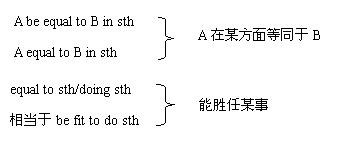1.broad adj. 宽的
(1)a broad street (river) 宽阔的街道(河流)
(2)He is tall, broad and muscular. 他身高肩宽,肌肉发达。
辨析:broad与wide
它们都有“宽”的含义,常可换用:
如:The river is 300 feet broad (wide). 这条河有300英尺宽。
broad着重指幅面的宽广;此外,还修饰背、肩、胸等的宽阔。
(1)We saw the broad ocean. 我们看到了广阔的海洋。

(2)His back (shoulder, chest) is broad. 他的背部(肩膀、胸部)很宽阔。
wide 着重指从一边到另一边的距离;此外还指口、眼睛的“大”。
(1)How wide is the cloth? 这块布有多宽?
(2)She stared at him with wide eyes. 她睁大眼睛注视着他。
2.majority n. 多数;大半
(1)用作可数名词时,意思为“多数,大多数;过半数”,常与定冠词the和介词of连用,构成词组:a/the majority
of …,不可以说:majorities of…或the majorities of…。例如:
He won by a majority of 300.
他超过对方300票获胜。(多得的票数)
The majority of the students were presented.
大多数学生出席了。(the majority of相当于most of)
He believes that his supporters are in the majority.
他相信支持他的人占多数。(大多数)
(2)the majority 作主语时,其谓语动词既可用单数,也可用复数。例如:
The majority (of the people ) want/wants peace.
大多数人要和平。

The majority were/was in favour of the proposal.
大多数人赞成这个建议。
辨析:a/the majority of 与 most
a/the majority of +(the)+n.
大多数孩子喜欢吃糖果。
Most children like sweets.
Most of the children like sweets.
A/The majority of (the) children like sweets.
区别:
a/the majority of 大多数;大半
a large number of 很多,大量
3.total n. 总数;合计
adj. 总的;全部的;整个的
vt. 总数为;计算……的总数;把……加起来 [ tota(l)led , tota(l)ling]
The total came to /was 3,700 dollars.
合计是3700美元。(n.总数;总额)
A total of 45 weeks were spent on the study.
一共花45周的时间在学习上。
注意:
a total of (总共)修饰可数名词复数时,谓语动词用复数形式。
the total of … 后面的谓语动词用单数形式。
In total, there must have been 20,000 people there.(in total,
总共,合计,共计,相当于 altogether)
What is the total population of Britain?
英国人口一共多少?(adj.whole 总计的)
When I tell you to be silent I expect that silence to be total
.
我要你不出声,就是完全不出声。(完全的,complete)
Your debts total £100,000.
你总共负债十万镑。(v. 总计,合计)
The costs totalled up to ¥100.
费用合计人民币一百元。(total up to 合计,总计)
Please total these numbers.
请把这些数字加起来。(vt. 把……加起来)
拓展:totallyadv. 总共地,完全地
4.native
adj. 天生的;出生地的,祖国的,家乡的;本土的,本国的;(某地)特有的,原产的
n. 本地人,本国人;(某地)原有的动(植)物
They are native speakers of English.
他们的母语是英语。
He has been away from his native Poland for three years.
他离开故土波兰已有三年了。
The giant panda is native to China.
大熊猫是中国特有的动物。
Are you a native here, or just a visitor?
你是本地人还是只是过客?
The kangaroo is a native of Australia.
袋鼠是澳大利亚的土生动物。

5.equal adj. 相等的;胜任的
vt. 等于,比得上
用法:
(1)作adj.时,equal通常无比较级、最高级形式。作“相等的,同等的”,后接介词in和to。例如:
Mary is quite equal to Bill in brains.
玛丽和比尔一样聪明。(be equal to sb.in sth.)
Women demand equal pay for equal work.
妇女要求同工同酬。(adj.“同等的”作定语)
(2)作“能胜任的,经得起的”,指某人做某事的权力和能力,不作定语,与介词to 连用,to 是介词,不可以接不定式。例如:
I don’t feel equal to (doing) the job.
我恐怕不能胜任这个工作。(adj. 能胜任的)
Five plus five equals ten.
五加五等于十。(vt. 等于,和……相等,相当于 is equal to)
(3)作“比得上,敌得过”(to be as good/clever as),后接in, as。如:
None of us can equal her, either in beauty or as a dancer.
我们谁也没有她漂亮,舞也没有她跳得好。(equal sb. in sth./as +身份)
(4)作可数名词,作“相等的事物或数量,(地位等)相同的人”。例如:
I’ m not  in
beauty.
in
beauty.
论美我无法和玛丽比。(n. 相等的人)
总结:

6.communicate vt. 表述;传达;传递;传播(+to)
vi. 交流思想(或感情、信息等);交际,交往 (+with);通讯,通话 (+with)
Can you communicate your ideas clearly?
你能清楚地表述自己的想法吗?(vt. communicate sth.)
Did she communicate my wishes to you?
她有没有把我的祝福转告你?(vt. communicate sth. to sb.)
We learn a language in order to communicate.
我们学习语言是为了交流思想。(vi)
He had no way to communicate with his brother. (vi. communicate
with… )
他没有办法与他兄弟联系。
7.compare vt . 比较
(1)表示“比较,对照”时,可with或to 连用。例如:
He compared London to/with Paris.
他把伦敦与巴黎作比较。(compare... to/with...把……与……作比较)
The results have been carefully checked and compared.
这些结果已经过仔细核对和比较。(比较)
(2)表示“比喻为,比作为”时,只能与to连用。例如:
Shakespeare compared the world to a stage.
莎士比亚把世界比作舞台。
People like comparing beautiful girls to flowers.
人们喜爱把漂亮的女孩比作花朵。
(3)可用作vi,意为“比得上”。例如:
Walking can’t compare with flying.
走路比不上飞行。
compared to/with常用作后置成分,意为“与……比较,对照”。例如:
London is large, compared to/with Paris.
与巴黎相比较之下,伦敦较大。(compared to/with与……比较,对照)
8.exchange v. 交换;互换;调换
n. 交换;更换
They exchanged angry words before the meeting but were finally
persuaded to agree.
他们在会议前争吵起来,经劝说最后言归于好。
Is five apples for five eggs a fair exchange?
用五个苹果换五个鸡蛋公平吗?
He’s giving her French lessons in exchange for her teaching him
English.
他教她法语,她教他英语,互教互学(作为交换条件)。
常用搭配:
exchange A for B 以A换B
exchange sth. with sb. 同某人交换某物
He exchanged the blue sweater for a red one.
他把蓝毛衣换成了红的。
Ali exchanged seats with Ben.
阿里与本调换了座位。
1.make yourself at home 别客气;随便;无拘束
If you get to my house before I do, help yourself to a drink and
make yourself at home.
如果你在我之前到我家,自己喝点饮料,随便一点。
-Can I turn on the TV? 我可以打开电视吗?
-Yes, of course. Just make yourself at home. 当然可以,请不要拘束。
2.make up 补足;编造;组成
We need $ 50 to make up the sum required.
我们需要五十美元以补足所需要的数目。(补足)
The whole story is made up.
整个故事完全是虚构出来的。(编造,虚构)
The medical team was made up of twelve doctors.
医疗队由十二名医生组成。(组成,常用被动语态be made up of…)
3.except for 除了……之外
except for 常置于句首,也可置于句中表示“不同于一般情况的例外情况”,先说明基本情况,然后在细节上加以修正,从而引述出一个相反的原因以修正主要意思。其特点是前后没有相互对称的同类格,并且常用在陈述句中。例如:
Except for a few spelling mistakes, your composition is good.
(修正细节)
你的作文很好,只有几个拼写错误。
Except for one old lady, the bus was empty.
除了那个老妇人外,公共汽车空空的。(old lady与bus不是同类格)
The road was empty except for a few cars.
除了几辆车子外,路上空荡荡。(road与car不是同类格)
注意:有时用except的地方可以用except for替换,但是能用except for的地方不一定都能用except来替换。例如:
He answered all the questions except for the last one. (except)
除了最后一道题,其他所有的问题他都答了。
Everyone was tired except for John.
除了约翰外,大家都累了。(except)
但except一般不放在句首。
except for还可以作“若非,如果不是”相当于but for或without。例如:
Except for you, I should be dead by now.
如果不是你,我早就死了。
She should leave her husband except for the children.
如果不是为了孩子,她会离开丈夫。
提醒:exceptprep.除……外,有时可以用 except for 替代,有时则不能,例如:
I can take any holidays at time except in August.
除了八月外,我什么时候都可以休假。
(except后接介词短语时不可用except for)
I know nothing about him except that he lives next door.
我对他一无所知,只知道他住在隔壁。
(except that 后接从句,除that之外,还有except when/except what/except where等)
4.come about
(1)发生(to happen)
(2)(船,风)改变方向(of a ship or the wind to change direction)
用法:是一不及物动词词组,不可有宾语,没有被动语态。例如:
How did this dangerous state of affairs in Europe come about?
欧洲这危机是怎样发生的?
They didn't know how the change had come about.
他们不知道这个变化是怎样产生的。
Many a quarrel comes about through a misunderstanding.
很多争吵是由误解引起的。
How does it come about that you are here, not in Boston?
你怎么不在波士顿,反而在这里?
I never understand how it came about that you were an hour late
on such a short journey.
我真不懂这么短的路程你怎么会迟到一个小时。
The wind has come about to the north.
风转向北吹。
归纳:英语中表示“发生”的词及其短语,一般没有被动语态,作不及物动词来使用。如happen,
take place ,break out(爆发)等。
5.end up with 以……告终
end up with 也可用作end with,后接名词、代词或动名词。begin with是其反义词。例如:
The play ends up with Hamlet’s murder.
全剧以哈姆雷特被谋杀而告终。
The party ends up with a beautiful song.
晚会以一首优美的歌曲告终。
当美国人提到“最后”这个概念时,他们通常用的是end up with这个短语。
After seeing so many houses, we ended up with buying the one on
the lakeside.
看了那么多的房子之后,我们最后还是买了湖边的那栋房子。
end up with也有“最后有什么样结果”的意思,在许多地方用end up with会比finally来得更为恰当。
We ended up with having lunch on his chair. 我们结果在他的椅子上吃的午饭。
注意:end by也可作“以……告终”,但后接动名词。
辨析:end in/end up as/end up with/end up in
end in意思是“造成;终成”(to result in)。例如:
The war ended in everyone’s going home.
战争结果人人回家。(胜利)
His dream of becoming a superstar ended in bubbles.
他想成为超级明星的梦想终成泡影。
end up as意思是“以……身份而告终”,例如:
He ended up (as) head of a big company.
他最后当了一家大公司的老板。
end up in意思是“在……地点”或“以……方式而告终”。例如:
We may end up in China.
我们可能在中国结束旅行。
6.a great many 许许多多,极多
a great many也可作a good many,用法同many,只与可数名词复数连用,谓语动词用复数。例如:
A great/good many students are playing basketball on the playground.
许多学生在操场上打篮球。
a good/great many后不能接of,如果要接of,所修饰的名词前必须有the/those/these/one’s等修饰。例如:
A great/good many of the/those/his students are playing basketball
on the playground.
那些/这些/他的学生中的许多人在操场上打篮球。(a good/great many of the/these/those/one’s+
n.)
比较:a lot of/a large number of
a lot of 也可作lots of ,可接可数复数与不可数名词
a large number of 只接可数名词复数
a good/great many 只接可数名词复数
7.bring in 引进;引来;吸收
We should bring in new technology.
我们应该引进新技术。
He brings in 800 dollars a month.
他一个月挣八百美元。
They started to use English, but they also brought in some words
from their own languages.
他们开始使用英语,但他们也从他们自己的语言中引进一些词语。
8.have some difficulty in doing sth. 做某事有困难(接名词时,常用句型:have some
difficulty with sth.)
Everyone in the town knew him so we had no trouble / difficulty
in finding his house.
镇上谁都认识他,因而我们毫不费事地找到了他的家。
We had great difficulty in building the house.
我们建房子费了很大劲。
The students had some trouble in answering the question.
回答这个问题有些困难。
Do you have any trouble in finishing the work within two days?
两天内你完成这项工作有困难吗?
She said she had some difficulty with pronunciation.
她说她在发音方面有困难。
在使用这一句型时应注意以下四点:
(1)difficulty/trouble为不可数名词,意为“困难”。
(2)修饰语主要有no, little, some, much, great等。
(3)句中介词为in,有时可省略。
(4)介词in后必须跟动词的-ing形式。
1.What is it that Joe can’t find in the bathroom?
Joe在浴室里找不到什么东西啊?
本句为特殊疑问词开头的强调句型,即强调句型的特殊疑问句。强调句型的基本构成如下:It+is (was) +被强调部分+that
(who)+句子剩余部分。
It was in the street that I found the purse.
我是在街上找到钱包的。(强调地点状语,强调是“在街上”而不是在其他的地方。)
It is I who should be responsible for the incident.
是我应该对事故负责。(强调主语,是“我”而不是别人)
Why was it that you used to skip classes?(强调原因状语,疑问词就是被强调的部分)
2.John is an American who has come to Britain for the first time.
约翰是一个美国人,他第一次来到伦敦。
for the first time意思是“在第一次”。
注意:“在第一次”不可写为:at/in the first time. 例如:
这是我第一次到黄冈。
I have come to Huanggang for the first time.
或者:It/This is the first time that I have come to Huanggang.
It/This is the first time that+从句(谓语动词须用完成时)
或者:It/this is the first time for me to come to Huanggang.
(It/This is the first time for sb. to do sth.)
What do you say when you meet a foreigner for the first time?
你和一个外国人第一次碰面时,你说什么?
Yesterday he was beaten by his father for the first time.
昨天他第一次挨了父亲的打。
比较:for the first time与the first time
the first time多用作从属连词,相当于:when …for the first time意思是“在第一次(做……)”作此义时,常放在句首,后面必须跟有主语。例如:
The first time Tom met Mary, he fell in love with her.
汤姆第一次见到玛丽时,就爱上了她。
相当于When Tom met with Mary for the first time…
或The first time when Tom met with Mary…
I felt you different from others the first time I saw you.
我第一次见到你就觉得你与众不同。
Mary was reading under the tree the first time I met her.
我第一次遇到玛丽时她正在树下看书。
3.For example , the British took “typhoon” from Chinese , while
the Americans took “tornado” from Spanish.
例如:英国人从汉语借来了typhoon(台风),而美国人从西班牙语借来了tornado(飓风)。
while在本句中作连词。用来作强烈的对比,用于引导一个不同的事项,以便与第一句作对照。意思是“但是,可是,而”。例如:
While their country has plenty of oil, ours has none.
他们国家石油很丰富,我国一点石油都没有。
You like sports , while I’d rather read.
你爱运动,我爱看书。
Mary is very tall while her brother is very short.
玛丽很高,而她弟弟却很矮。
除此之外,while作““当……的时候”讲,但必须注意,while作此义时,所接从句的谓语动词必须是表示一段时间的持续动词。例如:
While I was out he started to cry.
我不在的时候他开始哭了起来。(When)
下面句子为错误句子:
While I bought the pen in the shop , my telephone rang. (buy是短暂动词)
当我在商店买钢笔时,我手机响了。
Strike while the iron is hot.
趁热打铁。(谚语)
while还可作“虽然,尽管”讲。
While I admit his good points, I can see his shortcomings.
尽管我承认他的优点,我还是看到他的缺点的。
4.With so many people communicating in English every day, we can
see that it will be more and more important to have a good knowledge
of English.每天有如此多的人用英语交流,我们知道掌握英语将越来越重要。
(1)with so many people communicating 是“with+宾语+现在分词”结构,相当于Because
so many people communicate in English…,又如:
With winter coming on, it's time to buy warm clothes.
随着冬天来临,是买暖和衣服的时候了。
John soon fell asleep with the light still burning.
不久约翰开着灯睡着了。
with后除了能跟-ing的复合结构外,还可以跟:
His wife came downstairs, with her son in her arms.
他的妻子下楼了,手里抱着儿子。(with+宾语+介词短语)
All the afternoon he worked with the door locked.
他整下午把门锁着工作。(with+宾语+过去分词)
I can't go out with all these dishes to wash.
有这些盘子要洗我不能出去。(with+宾语+动词不定式)
With John away, we've got more room.
约翰走了后,我们有更多空闲位置。(with+宾语+副词)
(2)have a good knowledge of sth. 掌握……,对……有某种程度的了解
He has a good knowledge of London.
他对伦敦有所了解。
A good knowledge of languages is always useful.
掌握语言总是有用的。